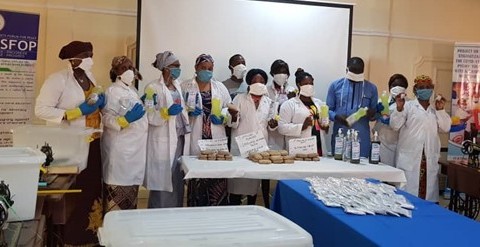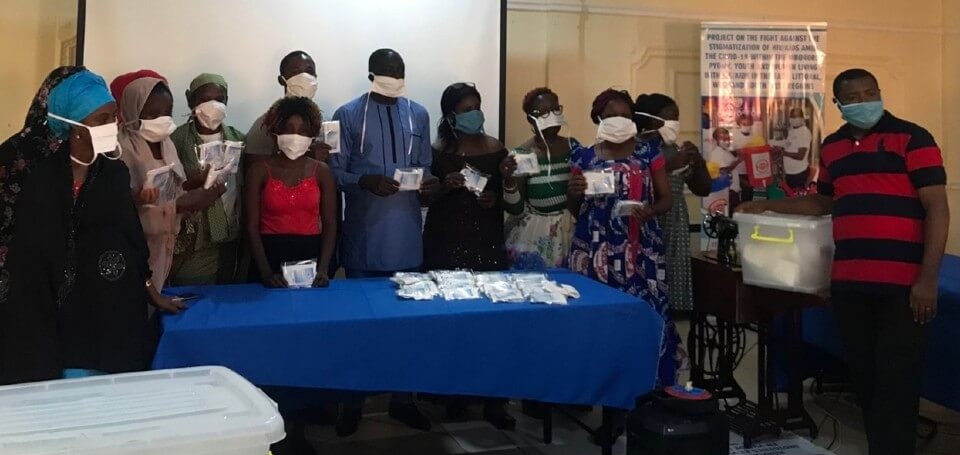Empowering vulnerable women from East Cameroon through income-generating skills amid COVID-19
Date:

From 19 to 22 January 2021, UN Women held a training session for 20 women from vulnerable communities to amplify their voices through income-generating opportunities seeking. The event took place at the Christiana Hotel in Bertua, East Cameroon. Titled “COVID-19 intervention within vulnerable women groups in East and South West regions of Cameroon”, the training session is part of a project implemented by the Cameroon Youth and Students Forum for Peace (CAMYOSFOP), in collaboration with UN Women. The project’s main aim is to increase and enhance the capacity of women to set up and manage COVID-19-induced businesses, including the production of standardized reusable cloth barrier masks and the production of antiseptic soap and hydro-alcoholic gels.
To create a platform that would foster the management and response to COVID-19, the 20 women participants selected for the workshop were trained in a unit of ten persons per group. Half of the participants were trained as seamstresses to produce face masks, while the other half were taught to produce antiseptic soap, hand sanitizers, and other virus protection products. Furthermore, the women have been educated on financial management and marketing strategies, with the goal to provide them tools to reinforce their capacities to create income-generating activities.
Ngalim Eugine Nyuydine, Director of CAMYOSFOP, drew participants’ attention to CAMYOSFOP and UN Women’s collaborative work to empower vulnerable women towards increased economic independence, especially with the outbreak of the COVID-19 pandemic.
Confronted with the pandemic, these vulnerable groups, as well as most families, have been and are forced to prioritize other needs such as food and utility bills over purchasing COVID-19 prevention kits like antiseptic soap and face masks, Mr. Nyuydine explained.
Zambo Bouchard, UN Women’s national expert on gender, welcomed and encouraged participants to concentrate on learning skills to empower other women. In addition, he advised against women’s depending on men to earn a living and called participants to improve their livelihoods, mainly through entrepreneurship and its aspects of production, body language, communication, building trust, market strategy, and packaging.

Testimonies
“I am amazed at the outcome of the production of the different products, especially bleach, soap, and menthol, as I could not believe that I could also produce what I used to buy from the market. I am pleased that I will be able to produce for my community and other communities. In addition, I look forward to sharing with other women and girls the skills and knowledge I have acquired during this workshop so that we can all generate income”, Mariamaou, beneficiary of the training.
“I cannot express the joy I feel, to see that I am chosen as one of the beneficiaries of this project. I am going to put in my best to work and earn a living and inspire other girls to also learn new skills. I received more than my expectations. The workshop was practical and simple for us participants and especially for me to understand. I am taking the commitment to practice often and hopefully create other things and expand the business”, Desma Olinga, beneficiary of the training.
With the need to financially empower women, CAMYOSFOP and UN Women have handed over to beneficiaries work materials, including sewing machines and accessories awarded to the seamstresses and bags containing different kinds of chemicals to the group producing detergent, in a bid to encourage them and their communities to tackle poverty.
The project’s next step will be the South West Region for national-centred efforts.